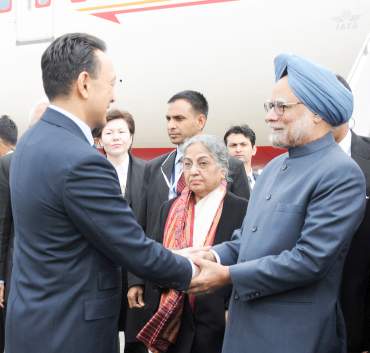
After spending three days interacting with the Brazilian, Chinese, Russian and South African Presidents in Sanya, southern China, Prime Minister Manmohan Singh flew across the expanse of East Asia to Astana, Kazakhstan's flashy new capital.
One colleague on Air India One, the prime minister's special flight, asked this reporter why the 78-year-old prime minister was making this tiring journey (a 7 hour, 20 minute flight) after all those hectic interactions in China when no relationship-transforming agreements currently appear on the anvil in Kazakhstan.
Three reasons: Geography. Natural Resources. Strategic relevance.
And, oh, did we mention China?
When Dr Singh meets President Nursultan Nazarbayev at the Ak Orda, the presidential palace, on Saturday morning, he will be the first world leader to meet the Kazakh leader after his April 3 election victory (eat your heart out Indian politicians, Nazarbayev won 95.5 per cent of the vote).
It will also be the first visit by an Indian prime minister since June 4, 2002 when then prime minister Atal Bihari Vajpayee visited Kazakhstan's then capital Almaty for the first CICA summit. The Conference on Interaction and Confidence Measures in Asia is Nazarbayev's personal multilateral diplomatic initiative to ensure that Central Asia, where Kazakhstan is the biggest nation, stays calm.
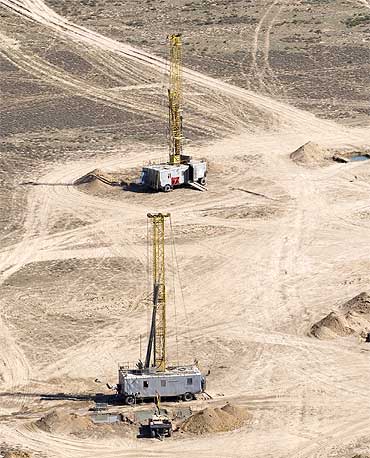
No Indian leader can stay away from Central Asia for so long especially when China appears, in the opinion of some observers, to be the 'only great power pursuing a coordinated strategy in Central Asia,' expanding trade and exploiting the region's natural resources.
China has an impressive footprint in Kazakhstan, already. In February, during Nazarbayev's visit to Beijing (he visits the Chinese capital every year), Kazakhstan agreed to supply uranium pellets to Chinese nuclear plants, a deal worth billions of dollars.
Kazakhstan has the second largest uranium deposits in the world, more than 15 per cent. This year, Kazakhstan will produce 19,600 tonnes of uranium; it has enough reserves to last more than a hundred years.
India too is interested in Kazakhstan's uranium and Atomic Energy Commission Chairman Dr Sukumar Banerjee is already in Astana to discuss an agreement on possible supplies. The DAE and Kazakh's nuclear establishment are also likely to work on a feasibility report to provide Indian small reactor technology to the Kazakhs.
Interestingly, the four groups the DAE set up in the wake of the Fukushima disaster last month to examine the state of readiness at India's nuclear reactors to deal with a catastrophe like the one that befell the nuclear plant in Japan will submit their reports soon.
The DAE committees, sources said, are likely to review among other things, the review criteria for sites to locate future nuclear reactors as well as operating measures at plants like the nuclear facilities in Tamil Nadu. Eventually, the government plans to make these DAE reports public, the sources added.
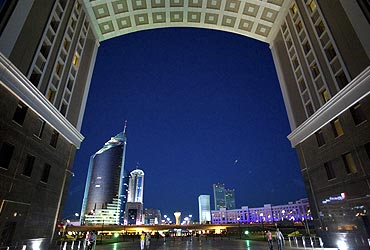
Dr Singh's government will also introduce a bill in the monsoon session of Parliament, which among other things will free the Atomic Energy Regulatory Board from the DAE's control, something the department is expected to resist with all its might.
This will mean that the AERB will be empowered to look at all institutions involved with radioactive material, not the nuclear establishment alone, and try to prevent incidents like the one in Delhi last year where cobalt-60 allegedly from Delhi University made its way into the market and caused one death.
India is also looking at an expanded role in Kazakhstan's oil and natural gas reserves, with the Oil and Natural Gas Commission expected to sign an agreement on oil exploration during Dr Singh's visit.
Kazakhstan has 1.82 trillion cubic metres of natural gas and 39.8 billion barrels of oil, more energy reserves, it has been said, than all other four Central Asian nations combined.
India will, of course, find it difficult to match China's involvement in Kazakhstan's petroleum industry -- 26 per cent of foreign investment in the Kazakh oil and natural gas sector is Chinese.
According to one observer, China wants the Central Asian oil pipelines to flow eastwards, hence Beijing has spared no expense for its oil companies to buy oil and gas companies in Central Asian countries, and also build the necessary infrastructure to ensure this.
One of the most dramatic projects in this regard is the 1,833 kilometre Central Asian pipeline that stretches from Turkeministan via Kazakhstan and Uzbekistan to China's Xinjiang province. Launched on December 14, 2009, it will reach full capacity by 2013.
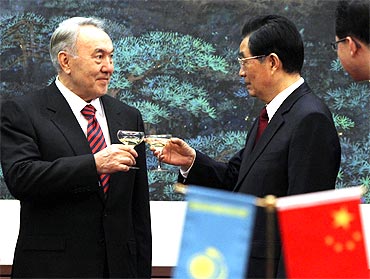
Richard Morningstar, President Barack Obama's adviser on Eurasian energy, told the United States Congress last year that 'the US cannot compete with China when it comes to Central Asian energy wealth.'
Given that Kazakhstan or its Central Asian neighbours are not exactly next door, as they are with China, India has been more cautious with its pipeline dreams.
Sources revealed on Friday that after four years, a technical feasibility study on the Turkmenistan-Afghanistan-Pakistan-India -- TAPI -- pipeline has been completed. An enabling agreement was also signed last year, but the sources said this does that mean TAPI is imminent.
"It makes sense to hedge our options," the sources said, discussing India's energy diplomacy. "Wherever we get energy -- Angola, Myanmar, Sudan, Venuzuela -- we are there. It is not that we ship that oil back to India. We trade, we swap." But clearly it is not enough, since 67 per cent of India's oil imports still come from the Middle East and North Africa."
The sources also revealed that India has not given up on the controversial Iran-Pakistan-India pipeline. The Americans have often been reported to be livid about the IPI pipeline, but the sources said this angst has never been communicated to the Government of India.
Of course, the sources said, if one is building a $6 billion (about Rs 27,000 crore) pipeline and a $30 billion (about Rs 135,000 crore) industry at the end of it, one must be certain of assured supply and the physical security of the pipeline.
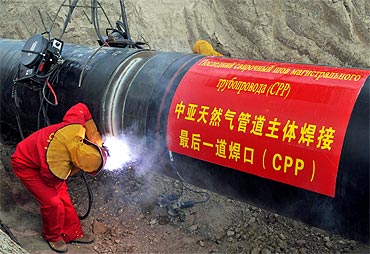
Many Indian observers have been sceptical that an oil pipeline which passes through some of the most hostile parts of this planet would ever be secure.
TAPI will have a different route -- the pipeline would pass through Pakistan Punjab -- than the IPI where the pipeline would pass through restive Baluchistan where rebels have long mounted an offensive against the Islamabad regime.
The sources, however, played down these fears, saying that even at the worst times, oil pipelines have remained intact through the insurgencies in Angola, Congo and Sudan. "There is very little advantage in scuttling a pipeline," the sources felt.
Reuters reported earlier this year that India has built a 200 kilometre road from Nimroz in Afghanistan to Chabahar port in southwest Iran. Though the Indian government has declared its intent to invest in and develop Chabahar, the Iranians are yet to play ball.
Chabahar is barely 72 km from Pakistan's Gwadar port where the Chinese have invested hundreds of millions of dollars so that oil tankers from the Persian Gulf can dock there and the oil can be transported over the Karakoram Highway to China, bypassing the Strait of Malacca, which the Chinese fear the Americans could block off one day in the event of a Sino-US face-off.
If the Indians succeed in gaining access to Chabahar, it could provide a route for hydrocarbons from Central Asia to make its way to India, first over land in Afghanistan and thereafter by sea.

This is an important year for Kazakhstan. It will be 20 years this December 16 since it became the last republic to leave the Soviet Union.
In June Astana will host in rapid succession meetings of the World Islamic Economic Forum, the Organisation of Islamic Conference and the Shanghai Cooperation Forum, apart from the fourth Astana Economic Forum which seven Nobel Laureates in economics will attend.
Nursultan Nazarbayev will host all those events as the proud holder of a new election record (in 1999, he won 81 per cent of the vote; in 2005, it went up 10 points, to 91.2 per cent). His term was to expire next year, so observers are puzzled that he chose to call an early election months after the Kazakh parliament, where his Nur Otan party holds every seat, asked him to continue in power as long as he wanted, as the 'Father of the Nation.'
Did the recent events in Egypt and Libya unnerve Nazarbayev who has ruled his country with an iron hand (ironically, it is said he may have still won even if the election was truly free and free, albeit with a reduced majority)?
Did the infighting in his family -- Nazarbayev has three daughters, who are said to be constantly bickering for political influence -- compel him to seek a fresh election mandate till he sorted out the matter of his successor?
At the current moment, this could either be Timur Kulibayov, who is married to Nazarbayev's second daughter Dinara and who featured in Wikileaks cables for his alleged 'avarice' or Nazarbayev's nephew Kairat Satybaldy, who is said to be the son the Kazakh leader never had.
His elder son-in-law Rakhat Aliyev, once the most powerful man in Astana, is now Nazarbayev's most bitter enemy, firing off one damaging revelation after another from his sanctuary somewhere in Europe.
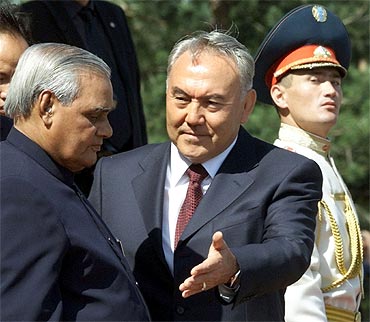
Soon after Nazarbayev returned from Beijing in February, Aliyev claimed -- without any proof, of course -- that the Kazakh leader had agreed to lease a million hectares of land to China for 99 years, clearly aware that it plays to the fears of many Kazakhs that this could lead to the Kitalizatsiya (Sinification) of their country.
India was the first nation outside the Commonwealth of Independent States that Nazarbayev visited after Kazakhstan became independent, in February 1992. He has visited New Delhi thrice since -- in December 1996, in February 2002 and, most recently, in January 2009, when he was the chief guest at the Republic Day parade, two months after the 26/11 attacks.
Unlike his neighbours who have periodically confronted Islamists, Nazarbayev has ensured from the very beginning of his reign that the fundamentalists are marginalised. Of course, as the Jasmine Revolution demonstrated so eloquently, the conventional wisdom about the durability of rulers who keep their people in check could dramatically change overnight.
Nazarbayev realises this danger, which is why during his inauguration last week, he promised political reforms. Earlier, he also spoke of moving the youth in his country away from 'dependence on natural resources.'
India's current strategy in Central Asia involves information technology, education and medicine. In Nazarbayev's desire for carefully calibrated change may lie India's big chance to make some headway in the Great Game in Central Asia.